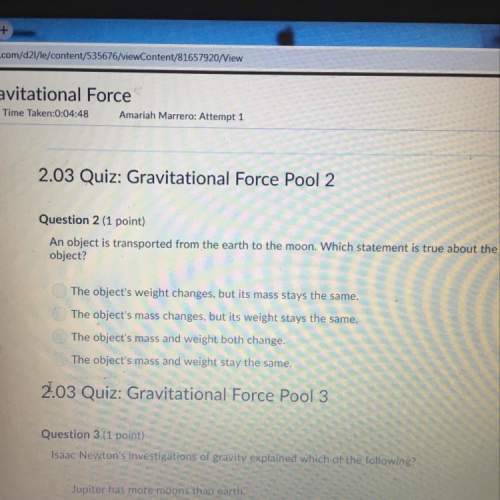
Chemistry, 03.03.2020 23:47 thealienminecra
For the reaction of A and B forming C, A(g)+ B(s)⇌ 2C(g) how will the reaction respond to each of the following changes at equilibrium? Drag the appropriate items to their respective bins.
a) double the concentration of B and halve the concentration of C.
b) double the concentrations of both products and then quadruple the container volume.
c) double the container volume.
d) double the concentrations of both products.
e) add more A.
f) double the concentrations of both products and then double the container volume.

Answers: 3


Another question on Chemistry

Chemistry, 22.06.2019 15:20
Water is initially present in a state where its molecules are far apart. during a change of state, its molecules slow down. which change of state has most likely taken place? from a gas to a liquid from a liquid to a gas from a solid to a liquid from a gas to a plasma
Answers: 1

Chemistry, 22.06.2019 18:50
Question 3(multiple choice worth 4 points) (04.04 lc) what does it mean when an element is reduced? it empties a valance shell, reducing its atomic radius. it gains electrons, reducing its overall charge. it increases electronegativity, reducing its ability to bond. it loses electrons, reducing its electron number.
Answers: 1

Chemistry, 22.06.2019 23:00
The data below were determined for the reaction shown below. s2o82– + 3i – (aq) → 2so42– + i3– expt. # [s2o82–] (m) [i –] (m) initial rate 1 0.038 0.060 1.4 × 10 – 5 m/s 2 0.076 0.060 2.8 × 10 – 5 m/s 3 0.076 0.030 1.4 × 10 – 5 m/s the rate law for this reaction must be:
Answers: 1

Chemistry, 23.06.2019 02:00
When an experimenter draws a conclusion that he assumes will apply to all situations set up similarly to his test situation, even though he cannot possibly have examined all possible test scenarios, the experimenter is using deductive reasoning inductive reasoning abductive reasoning subjective reasoning
Answers: 1
You know the right answer?
For the reaction of A and B forming C, A(g)+ B(s)⇌ 2C(g) how will the reaction respond to each of th...
Questions



English, 31.07.2019 16:00






Health, 31.07.2019 16:00




Mathematics, 31.07.2019 16:00










